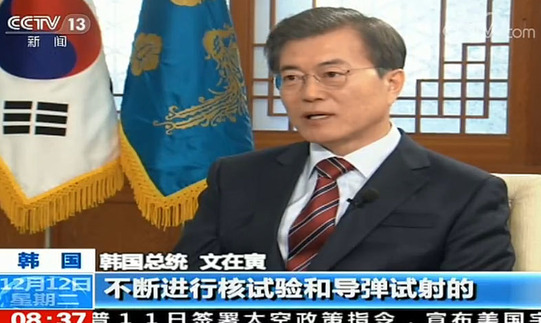Posted on : Dec.13,2017 17:35 KST
Modified on : Dec.13,2017 18:09 KST
 |
|
China’s CCTV airs an interview with President Moon Jae-in on Dec. 12. (taken from CCTV)
|
On Dec. 13, South Korean President Moon Jae-in will pay his first state visit to China. On Dec. 12, China’s state-run China Central Television (CCTV) broadcast an interview with Moon, with the narration inserted between the questions and answers in the broadcast strongly suggesting that South Korea was completely responsible for the THAAD conflict and that China was doing a big favor by taking steps to resolve it.
The narrator said that putting a “seal” on THAAD “was a decision that China had made in consideration of the overall direction of the development of its relations with South Korea” and that “the development of bilateral relations in the future would be determined by the extent to which South Korea implements its avowed position [the three no’s].”
The host of the interview also did little more than doggedly ask about Seoul’s implementation of the three no’s: “What effort do you think is necessary [on the THAAD issue]?” “What measures will South Korea be taking?” “Can you specifically tell me what direction South Korea will be moving toward?” Even taking into account that CCTV is designed for the Chinese audience, focusing so relentlessly on a single issue during an interview with the leader of a country who is about to attend a summit there and then adding one-sided commentary in the editing process is not only biased and inappropriate but even smacks of arrogance.
Moon’s visit to China is supposed to be an opportunity to ease conflict between the two countries over the THAAD issue and to restore trust. But it’s extremely troubling that China appears to be exacerbating the conflict just before his visit. During a bilateral meeting with his South Korean counterpart on Dec. 9, Chinese Foreign Minister Wang Yi once again called on South Korea to implement its “three no’s” – no participation in the US missile defense system, no deployment of additional THAAD batteries and no joining a military alliance with the US and Japan.
As the summit meeting approaches, the issues facing South Korea and China can be boiled down to THAAD, the North Korean nuclear program, and the economy. In terms of resolving THAAD, the two countries have already agreed to the principle of the “three no’s,” so all they need do is keep an eye on each other. South Korea didn’t promise to reverse what it has already done, so what more can it be expected to do about what it has promised not to do in the future?
It’s inadvisable for China to keep trying to receive assurances from South Korea on this point. Of course, domestic politics do seem to be a big factor here, as China attempts to underline its diplomatic achievement in regard to the THAAD deployment. But it would be nice if China bothered to take into consideration the position of South Korea, which also has to bear in mind its relations with the US.
In his CCTV interview, Moon said that “we have been assured by the US that THAAD will not infringe upon China’s security interests” and that “we also think it’s necessary to see things from the other side’s point of view.” There are even reports that Seoul has asked the US to delay the South Korea-US joint military exercises, which overlap with the Pyeongchang Winter Olympics. South Korea appears to be showing that it’s serious, but China’s measures to curtail the “THAAD retaliation” don’t feel adequate.
At any rate, the South Korea-China summit must not be an event at which the two leaders pick a fight and get red in the face. They must have the attitude of seeking commonalities and respecting differences. Even on the North Korean nuclear issue, there are many points on which the two countries are on the same page, including that war must be avoided and that the goal of denuclearization must be maintained. That’s why it’s too bad the two leaders decided not to hold a joint press conference or release a joint statement.
But we think there’s no point in insisting upon a joint statement when the two sides aren’t in complete agreement. Simply having the two leaders sit next to each other in China and smile at each other could send a message to the two peoples about their bilateral relations. Moon’s visit should be an opportunity to take the first step toward reciprocal relations between South Korea and China.
Please direct questions or comments to [english@hani.co.kr]






